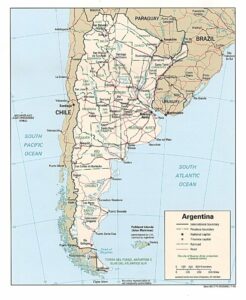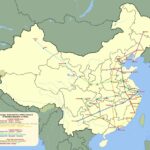Argentina is a wonderful nation with a bad economic reputation: quite similar to Italy, which contributed so much with its immigrants to country’s development. Three and a half millions of Genoese and Neapolitans in 1870-1920 joined Spanish immigrants to exploit local resources, in a 50/50 proportion, to make the country one of the richest in the world in that time, as we can see in Buenos Ayres magnificent urban structure remembering famous European cities, like Paris and London. English enterprises also contributed a lot in building the consistent railway system of 47000km, today 34000, the most extended of South America and one of the most important in the world. The relationships with Italy were so intensive that a project of unification of the two countries was circulating in Italy, but the government was engaged in civil war in the South. Today can be estimated in 25 million on a total population of 45, the Argentinians of Italian origin. Italians were generally interested in working a lot to send money at home, so the political class has been mainly recruited among Spanish immigrants, and after the First World War social turbulence and lack of strategical vision weakened the country until the Second World War, at the end of which the dictatorship of Juan Domingo Peron was taking the power from 1946 to 1955. He and his wife Evita helped Italy with a lot of meat: in 1948 my Argentinian grandmother went by Vulcania ship to take her pesos, at the moment 700Lit/Peso, more than $, and by houses for son and daughters in Italy. This national-socialist experience marked deeply Argentina, developing a State economy but more than that a parasitic culture always waiting helps from collectivity, instead of developing entrepreneurial private attitudes. Joint with a nostalgic immigrants mind producing too much tango music, very sad and melodramatic, the country lost the original pushing to the growth and business, quite anticipating the decline of Italy after 1970, for a similar political and cultural mood.
The mitology of Evita Peron demagogy and populism (famous song of Evita comedy and movie: Don’t cry for me Argentina) has been an expression of this depressing mood, only compensated from foot ball passion and heroes fame in the world. Falkland war at beginning of 80ties, during Tatcher UK strong government, notwithstanding some geopolitical justification, exhausted Argentina financial resources, always destroyed by high inflation rates, to provide social assistance to growing number of poors, estimated today at 18 millions. Unbelievable situation for the second largest country in South America, with a beautiful landscape, a high fertile soil (the Pampa), producing enormous amount of meat, cereals, soya, tea, quite self sufficient in oil and gas. Nice wines from the hills of Cordoba and their vineyards. To not speak about the beauty of Patagonia, Andes mountains and glaciers, lakes and rich animal fauna. Space and natural beauty everywhere until Ushuaia extreme end of world before Antarctica continent of the future. I said in other articles about my love for countries of South of the world, which give you the sense of large spaces available to human being, contrarily to the usual narrative about overpopulation.
Suddenly in this declining scenario and probably just because of this so long downgrading of potential possibilities, Milei has been elected on a severe neoclassical program, similar to the Friedman program in Chile after Allende, mainly inspired to the radical Austrian economic school of Von Mises and Hayek. In two months he gutted 21000 social assistance programs and reduced Ministries and bureaucracy, obtaining an historical surplus in balance, devaluating peso of another 50%. Of course he is in a total turbulence of Union strikes, but Argentinians seem to resist to their past and looking a way to become again owners of their future. Also foreign policy is rapidly returning to West after some dangerous tango with Chinese, owning a military/spatial base in Patagonia and trying to penetrate in local economy. Argentina doesn’t want to cry any more.



